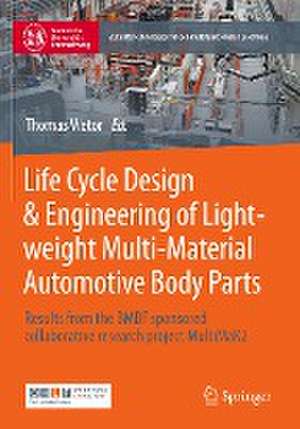Life Cycle Design & Engineering of Lightweight Multi-Material Automotive Body Parts: Results from the BMBF sponsored collaborative research project MultiMaK2: Zukunftstechnologien für den multifunktionalen Leichtbau
Editat de Thomas Vietoren Limba Engleză Paperback – 21 oct 2023
| Toate formatele și edițiile | Preț | Express |
|---|---|---|
| Paperback (1) | 520.61 lei 6-8 săpt. | |
| Springer Berlin, Heidelberg – 21 oct 2023 | 520.61 lei 6-8 săpt. | |
| Hardback (1) | 640.06 lei 3-5 săpt. | |
| Springer Berlin, Heidelberg – 20 oct 2022 | 640.06 lei 3-5 săpt. |
Preț: 520.61 lei
Preț vechi: 612.49 lei
-15% Nou
Puncte Express: 781
Preț estimativ în valută:
99.63€ • 108.18$ • 83.69£
99.63€ • 108.18$ • 83.69£
Carte tipărită la comandă
Livrare economică 22 aprilie-06 mai
Preluare comenzi: 021 569.72.76
Specificații
ISBN-13: 9783662652756
ISBN-10: 3662652757
Ilustrații: XII, 122 p. 64 illus., 50 illus. in color.
Dimensiuni: 168 x 240 mm
Greutate: 0.23 kg
Ediția:1st ed. 2023
Editura: Springer Berlin, Heidelberg
Colecția Springer
Seria Zukunftstechnologien für den multifunktionalen Leichtbau
Locul publicării:Berlin, Heidelberg, Germany
ISBN-10: 3662652757
Ilustrații: XII, 122 p. 64 illus., 50 illus. in color.
Dimensiuni: 168 x 240 mm
Greutate: 0.23 kg
Ediția:1st ed. 2023
Editura: Springer Berlin, Heidelberg
Colecția Springer
Seria Zukunftstechnologien für den multifunktionalen Leichtbau
Locul publicării:Berlin, Heidelberg, Germany
Cuprins
Development of Automotive Body Parts in Multi-Material Design - Processes and Tools.- Knowledge Management.- Levers of Cyber Physical Production Systems for Multi-Material Body Parts Manufacturing.- Modeling and Simulation of New Manufacturing Processes for Multi-Material Lightweight Body Parts to Estimate Environmental Impacts.- Consideration of Environmental Impacts of Automotive Lightweight Body Parts during the Conceptual Design Stage.- Life Cycle Design & Engineering Lab in the Open Hybrid LabFactory.- Publications in Course of the MultiMaK2 Project.
Notă biografică
Prof. Dr.-Ing. Thomas Vietor studied mechanical engineering at the University of Siegen and subsequently did his doctorate at the Institute of Mechanics and Control Engineering of the University of Siegen in the area of design and structural optimization of brittle material. From 1994 to 2009 he worked at Ford and, among other positions, headed the vehicle concepts department at Ford-Werke GmbH, Cologne, as well as the development department at Ford Motor Co. England. In 2009 he became Professor and director of the Institute for Engineering Design at the Technische Universität Braunschweig. Since 2013 Prof. Vietor is Board Member of the ForschungsCampus “Open Hybrid Lab Factory e.V.” and since 2017 Chief Executive Officer of the Automotive Research Centre Niedersachsen (NFF).
Textul de pe ultima copertă
This book presents the final report of the collaborative research project "MultiMaK2": MultiMaK2 contributed to the development of multi-material component concepts in large-scale automotive production. Whithin the project new methods in conceptual design of lightweight components were developed at the example of roof cross member and transmission tunnels. A concurrent Life Cycle Design & Engineering approach led to identifying eco- and cost efficient component alternatives. This includes evaluation tools for the concepts' full life cycle. Further, methods to integrate that knowledge into automotive engineering processes have been established based on principles of visual analytics. That brings forward a tight integration of data, engineering models and results visualization towards an informed knowledge building across disciplines. MultiMaK2 also compiled and structured design guidelines within a knowledge management system. All methods and tools have been embedded within the LifeCycle Design & Engineering Lab in the Open Hybrid LabFactory.
The Content:
Prof. Dr.-Ing. Thomas Vietor studied mechanical engineering at the University of Siegen and subsequently did his doctorate at the Institute of Mechanics and Control Engineering of the University of Siegen in the area of design and structural optimization of brittle material. From 1994 to 2009 he worked at Ford and, among other positions, headed the vehicle concepts department at Ford-Werke GmbH, Cologne, as well as the development department at Ford Motor Co. England. In 2009 he became Professor and director of the Institute for Engineering Design at the Technische Universität Braunschweig. Since 2013 Prof. Vietor is Board Member of the ForschungsCampus “Open Hybrid Lab Factory e.V.” and since 2017 Chief Executive Officer of the Automotive Research Centre Niedersachsen (NFF).
The Content:
- Development of Automotive Body Parts in Multi-Material Design - Processes and Tools
- Knowledge Management
- Levers of Cyber Physical Production Systems for Multi-Material Body Parts Manufacturing
- Modeling and Simulation of New Manufacturing Processes for Multi-Material Lightweight Body Parts to Estimate Environmental Impacts
- Consideration of Environmental Impacts of Automotive Lightweight Body Parts during the Conceptual Design Stage
- Life Cycle Design & Engineering Lab in the Open Hybrid LabFactory
- Publications in Course of the MultiMaK2 Project.
Prof. Dr.-Ing. Thomas Vietor studied mechanical engineering at the University of Siegen and subsequently did his doctorate at the Institute of Mechanics and Control Engineering of the University of Siegen in the area of design and structural optimization of brittle material. From 1994 to 2009 he worked at Ford and, among other positions, headed the vehicle concepts department at Ford-Werke GmbH, Cologne, as well as the development department at Ford Motor Co. England. In 2009 he became Professor and director of the Institute for Engineering Design at the Technische Universität Braunschweig. Since 2013 Prof. Vietor is Board Member of the ForschungsCampus “Open Hybrid Lab Factory e.V.” and since 2017 Chief Executive Officer of the Automotive Research Centre Niedersachsen (NFF).
Caracteristici
Methods and tools to design and manufacture eco- and cost-efficient lightweight structures in automotive engineering Case studies for redesigned automotive multi-material lightweight component concepts Methods for improved integration of Life Cycle Engineering into automotive development processes






